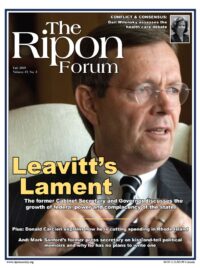
Congress passed the Chief Financial Officers Act 20 years ago, hoping to create new systems of accounting and fiscal management that would provide federal agencies with timely, consistent and reliable financial information and assure wise use of public resources.
A number of goals of the act have been realized, with more stringent financial audit requirements and internal controls now in place to keep better track of spending, reduce waste and fraud, and increase accountability across the government.
But many agencies still have not met the full requirements of the law, and the law itself has fallen short in many respects.
…many agencies still have not met the full requirements of the law, and the law itself has fallen short in many respects.
In this time of massive budget deficits, scarce resources and a high demand for services, the need is greater than ever for a clear picture of the financial condition, the performance, the future fiscal outlook, and risks for individual agencies and for the government as a whole.
Unfortunately, the mandatory audited financial statements required by the law often have become a political exercise for auditors to get a passing grade from the Office of Management and Budget (OMB) without actually providing useful information to managers, lawmakers or the public.
These annual audit reports are hundreds of pages in length, glance backwards at a moment in time instead of also being forward-looking, and often have little relevance to the business and goals of government agencies. Quite often, the audit reports are not even read by policymakers, and sometimes come in the door so late they are of no value at all.
One former federal CFO likened the process to a man riding in a hot air balloon that gets lost in a rain storm. When he shouts to a passer-by on the ground and asks where he is, he is told, “You are 300 feet in the air.”
The former CFO said this is similar to the annual audits. “They are technically correct, but the information is not very useful, and only provides a false sense of security,” he said. “What do they do to make a difference for the American taxpayer? Not very much.”
Altering the status quo will require changing the accounting and auditing standards to make the processes better suit the needs of the government.
This will require simplifying the financial statements and making them relevant. It will mean building in measurements for performance, the actual costs of doing business and various risk factors to help policymakers make prudent assessments.
One former CFO said he could produce detailed lists of all grants an agency gave to a particular city or a state, but could not tell the Cabinet secretary whether any of the money was spent properly or produced the intended results.
One former CFO said he could produce detailed lists of all grants an agency gave to a particular city or a state, but could not tell the Cabinet secretary whether any of the money was spent properly or produced the intended results.
Another former CFO noted the audited government financial statements parallel the private sector-style balance sheets that seek to measure assets, liabilities, profit, loss, and in effect, the value of a corporation. But she said the needs of the public sector are quite different.
“I used to spend a lot of time on personnel and inventory and real property, getting valuations of worth, like the value of a government building in Montana that we were never going to sell,” said the former CFO. “We spent a lot of time and money producing numbers that nobody needs, but we had to comply with the accounting rules.”
It is time for the government’s financial community and other stakeholders to come together, and with the leadership from the new administration that is committed to increased transparency, reach a consensus on change.
This change should integrate the government performance measurement agenda to help make each organization work better. That means incorporating the information germane to various parts of each organization such as the IT, human resources and acquisition communities. It also means making sure that CFOs are not just viewed as glorified auditors, but as part of the leadership team.
Another important issue is the way the CFOs are chosen.
Currently, CFOs are nominated by the president and confirmed by the Senate. The process is lengthy, results in CFOs being subject to the political winds, and often means they have a relatively short time in office.
One solution would be to eliminate Senate confirmation but still have the CFOs appointed by the president to increase the likelihood that they will be included in an agency’s inner circle. At the same time, CFOs should be given fixed terms of perhaps five years to provide more independence and a chance for longer term strategic planning. Under such a scenario, CFOs should be required to appear before the Senate if the Senate wants them to testify.
There are other issues that deserve attention including human capital —the need for more professional training and leadership development, and the active recruitment of people with the right skills. The financial and audit requirements can be improved, but the in the end, the quality of the work will depend on the quality of the people.
The CFO Act has raised the importance of proper accounting standards in government and increased the stature of the financial professionals. Now it is time to move to the next phase and substantially raise the bar by connecting financial accounting to better outcomes in government.
Max Stier is president and CEO of the nonprofit Partnership for Public Service




